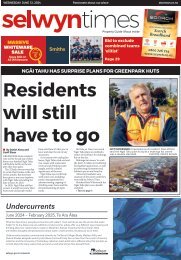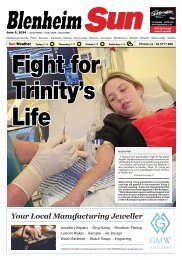You also want an ePaper? Increase the reach of your titles
YUMPU automatically turns print PDFs into web optimized ePapers that Google loves.
8<br />
Thursday <strong>June</strong> <strong>29</strong> <strong>2023</strong><br />
Public feud between city’s<br />
two most powerful women<br />
TWO OF the city’s favourite<br />
daughters once went head to<br />
head in a public scrap that was<br />
rather unbecoming of their<br />
status as ‘saints in the making’.<br />
The redoubtable nurse Sibylla<br />
Emily Maude – originator<br />
of what would become New<br />
Zealand’s district nurse<br />
programme and this country’s<br />
answer to Florence Nightingale<br />
– took on women’s suffragist<br />
and mother of the nation,<br />
Kate Sheppard, in a public<br />
disagreement which resonated<br />
in the letters to the editor pages<br />
of the Christchurch Star and the<br />
Lyttelton Times over the last few<br />
days of 1898.<br />
The interaction features in<br />
Judith Devaliant’s book Kate<br />
Sheppard: A Biography.<br />
“The issue concerned an<br />
anonymous woman who had had<br />
the misfortune of contracting<br />
what was clearly a rather nasty<br />
disease,” says Helen Osborne,<br />
property lead for Te Whare<br />
Waiutuutu Kate Sheppard<br />
House.<br />
Kate Sheppard’s Ilam home is<br />
today cared for by Heritage New<br />
Zealand Pouhere Taonga.<br />
“Suffragist Kate Sheppard<br />
and fellow women’s advocate<br />
Ada Wells wrote a letter to the<br />
editor highlighting the plight of<br />
the woman and her family and<br />
describing her condition as ‘a<br />
disease of loathsome form, the<br />
details of which are so revolting<br />
they cannot be here explained’.<br />
The zealous duo petitioned<br />
for the removal of the two sons<br />
of the woman in question so<br />
they could be lodged elsewhere<br />
in healthier surroundings as<br />
the boys were unable to isolate<br />
themselves within the rather<br />
pokey confines of their cottage.<br />
They argued the sons were in<br />
danger of becoming “a fruitful<br />
source of contamination to<br />
those with whom they come in<br />
contact”.<br />
Because the mother’s condition<br />
was a chronic one, the Charitable<br />
Aid Board had advised it had<br />
done all it could reasonably do.<br />
Both Sheppard and Wells asked<br />
people to send money to the<br />
newspaper to help out if they<br />
possibly could, adding “much<br />
could be said of the pitiful life of<br />
the children brought into hourly<br />
contact with hideous disease, but<br />
we refrain”.<br />
“From 1885 all hospitals<br />
were run by Charitable Aid<br />
Boards whose role was partly<br />
to assess patients to determine<br />
whether they could pay for their<br />
treatment. People assessed as<br />
‘paupers’ were treated for free,”<br />
says Osborne.<br />
“Boards and some members<br />
of the public were quick to<br />
expose people they believed<br />
were ripping off the system. The<br />
way patients were perceived by<br />
the Charitable Aid Boards was<br />
very important. Sensitivities<br />
CONTRIBUTIONS: Sibylla Maude started what would become New Zealand’s district nurse programme, while Kate<br />
Sheppard was the leader of the women’s suffrage movement.<br />
about communicable diseases,<br />
including venereal disease, made<br />
public health and fair access<br />
to treatment a hot issue that<br />
left many women particularly<br />
vulnerable.”<br />
The Lyttelton Times started to<br />
receive donations as a result of<br />
the letter, and before long, it also<br />
received another contribution<br />
from a reader – a letter from<br />
Maude, who had a few things to<br />
say about the original Sheppard/<br />
Wells letter. And when Maude<br />
said something, people had a<br />
tendency to sit up and listen.<br />
Maude announced in her letter<br />
that she knew the woman in<br />
question because – even though<br />
the patient wasn’t identified by<br />
Sheppard and Wells – it was<br />
obvious who they were referring<br />
to. She also said the woman had<br />
been under her personal care for<br />
years.<br />
And then she got stuck in:<br />
“The unfortunate sufferer is<br />
much distressed at the publicity<br />
now sought to be given, first<br />
without her knowledge or<br />
consent, and secondly because<br />
of the incorrect and alarming<br />
statements circulated as to the<br />
alleged contagious nature of her<br />
complaint,” she wrote, adding<br />
that the patient hadn’t actually<br />
talked to anyone about her<br />
plight, not least Sheppard and<br />
Wells.<br />
“She is not ‘lying prostrated<br />
from a disease of loathsome<br />
form’. She is able to walk about,<br />
enjoy fresh air, and I have<br />
taken her out and sent her for<br />
a drive, which I should be very<br />
unlikely to do if her condition<br />
were ‘a fruitful source of<br />
contamination’.”<br />
Maude also advised that<br />
the patient had refused any<br />
additional help beyond what she<br />
“receives already from private<br />
friends and the Charitable Aid<br />
Board” and that her sons were all<br />
healthy and in no danger from<br />
infection.<br />
The letter was followed by a<br />
note from the editor advising<br />
that donations would be<br />
returned to readers should it be<br />
found that the woman and her<br />
three sons were the ones at the<br />
centre of the original letter –<br />
such was Maude’s mana.<br />
It seemed that maybe this<br />
storm in the Royal Doulton<br />
teacup might be over. Until<br />
the zealous Kate and Ada<br />
double-downed on their original<br />
assertions in a second letter that<br />
appeared in the paper a couple of<br />
days later.<br />
“We have no wish to enter<br />
upon a controversy with Miss<br />
Maude whose “amour propre”<br />
[self esteem] as professional<br />
nurse seems to have been<br />
wounded,” they wrote.<br />
“Our object in writing to you<br />
was to obtain healthy conditions<br />
for the children.”<br />
They also challenged Maude’s<br />
medical assessment with the<br />
contrary view of an unnamed<br />
“medical man” they consulted.<br />
They also had a wee dig at<br />
Maude’s assertion that the two<br />
hadn’t actually talked to the<br />
woman concerned.<br />
“Miss Maude endeavours to<br />
throw doubt on our statement<br />
that we called at the cottage . . .<br />
we are sorry she should have so<br />
poor an opinion of our veracity.”<br />
The letters to the editor page – a<br />
slower, and only slightly more<br />
genteel 19th-century version<br />
of Facebook – drew further<br />
comment from readers keen<br />
to wade in. One ‘troll’ signing<br />
themselves as ‘A Rank Outsider’,<br />
for example, suggested “a little<br />
closer inquiry and a glance<br />
at a medical dictionary [by<br />
Mrs Sheppard and Mrs Wells]<br />
might have saved a certain poor<br />
sufferer a heartache instead of<br />
adding to her suffering.”<br />
And there the matter appears<br />
to have landed – a brief though<br />
very public spat between two of<br />
colonial New Zealand’s foremost<br />
female movers and shakers. The<br />
clash is revealing, Osborne said.<br />
“The debate illustrates the<br />
very different approaches taken<br />
by these women to the pressing<br />
social issues of the day – in this<br />
case healthcare,” she says.<br />
“Both were on the same ‘side’<br />
and shared common values. Kate<br />
Sheppard and Nurse Maude were<br />
both strong Christians with a<br />
very solid social conscience and<br />
sense of duty to the community,<br />
the poor and the welfare of<br />
women in particular. The fact<br />
that their different approaches<br />
appear to have put them at<br />
loggerheads in this situation is<br />
fascinating.”<br />
Politically astute Sheppard<br />
– the reformer and advocate<br />
– was interested in changing<br />
institutional structures that kept<br />
women and their families poor<br />
and powerless.<br />
Maude’s approach was to<br />
roll up her sleeves and help.<br />
Sheppard affected lasting<br />
institutional change by<br />
skilfully building up networks<br />
of influence around the<br />
country and the world. Maude<br />
crammed every waking hour<br />
with hands-on service to the<br />
poor and dispossessed, fuelled<br />
by compassion and bacon<br />
sandwiches, and in her latter<br />
years terrorising motorists in a<br />
donated car with her somewhat<br />
loose interpretation of the road<br />
code as she went about her<br />
rounds.<br />
“The two women epitomised<br />
policy v practical help; strategy<br />
versus sympathy. Both were<br />
reformers in their different ways<br />
and both left a lasting legacy,”<br />
says Osborne.<br />
When Sheppard died in 1934,<br />
the Christchurch Times wrote:<br />
“A great woman has gone, whose<br />
name will remain an inspiration<br />
to the daughters of New Zealand<br />
while our history endures.”<br />
A year later, almost to the<br />
day, Maude passed away. Loved<br />
by countless patients and their<br />
families, hundreds of mourners<br />
lined the streets as her funeral<br />
procession passed by.


















